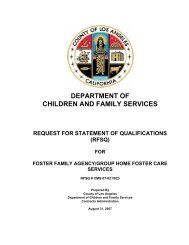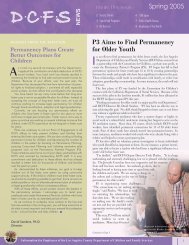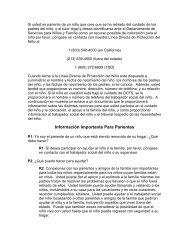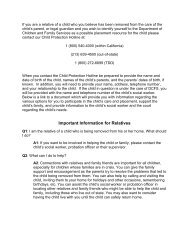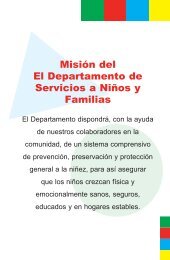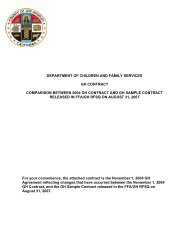Permanency Guide - Los Angeles County Department of Children ...
Permanency Guide - Los Angeles County Department of Children ...
Permanency Guide - Los Angeles County Department of Children ...
Create successful ePaper yourself
Turn your PDF publications into a flip-book with our unique Google optimized e-Paper software.
CONSIDERING ADOPTION<br />
Adoption <strong>of</strong>fers children and youth the highest legal level <strong>of</strong> permanence, after reunification. The Adoptions and Safe<br />
Families Act <strong>of</strong> 1997 (ASFA) requires that adoption be explored for any child who has been removed from his or her<br />
family for 15 <strong>of</strong> the last 22 months, although the law also includes some specific exceptions to adoption as the case<br />
plan. It is critical to remember however, that adoption is not the only option for permanence, and that all permanency<br />
options should be explored.<br />
Historically, only very young children were considered for a permanent plan <strong>of</strong> adoption. As awareness has grown<br />
regarding the urgent needs facing children and youth growing up in foster care with few or no permanent connections,<br />
attitudes regarding adoption for older children and youth have changed throughout the state and the country.<br />
There are several myths about adoptive families that must be explored and dispelled. Adoptive families can be related<br />
or non-relatives; they can be single, a couple, heterosexual, gay, lesbian, bisexual or transgender. The law requires<br />
that the adopter must be at least 10 years <strong>of</strong> age older than the person s/he is planning to adopt but this can be<br />
waived by the Court under certain familial circumstances.<br />
There are also several common myths about adoption <strong>of</strong> older children, which must be challenged as well. The<br />
primary myth to confront is that adoption is not an option for older children and that these youth are “unadoptable”.<br />
There is no such thing as a child or youth that is “unadoptable”!<br />
Nobody is ever too old to need a committed, supportive and loving<br />
family!<br />
All children and youth are adoptable, regardless <strong>of</strong> age, ethnicity, sibling group size, disability, sexual orientation or<br />
special needs. Whether adoption is the best permanent plan or not depends on the desires <strong>of</strong> the older child or youth,<br />
the legal circumstances <strong>of</strong> their case, and other important factors related to their situation. It is important to<br />
understand that families and youth together can redefine what adoption and family mean to them.<br />
Some important facts to know about adoption:<br />
♦ Kinship adoption is a viable option for family and non-related extended family members.<br />
♦ Adoption is an option for older youth and young adults, not just a plan for babies and young children.<br />
♦ Adoption does not have to mean losing contact with birth family.<br />
♦ Youth 12 and older must consent to being adopted.<br />
♦ Open adoption is an option if all parties agree.<br />
♦ Termination <strong>of</strong> parental rights does not have to mean the severing <strong>of</strong> relationships.<br />
♦ Tribal Customary Adoption, for ICWA eligible children, allows for adoption without terminating parental rights.<br />
♦ Adoption by a relative does not mean changing familial relationships. For example, a grandmother who adopts<br />
her grandchild becomes the legal parent, but can choose to remain in name and in fact, the child’s grandmother.<br />
♦ Voluntary Mediation services are available to develop a Post-Adoption Contact Agreement between adoptive<br />
and birth families, for ongoing contact and visitation.<br />
♦ The original birth certificate can be, but does not have to be, amended after adoption.<br />
♦ Adoptive parents must designate in their Will who is to care for all their minor children in the event <strong>of</strong> their deaths.<br />
♦ Financial support and post-adoption services are available after adoption <strong>of</strong> a Court dependant child.<br />
“It’s important to know that there is someone I can count on who wouldn’t turn their back on<br />
me.” -- Anonymous foster youth<br />
11



